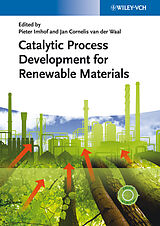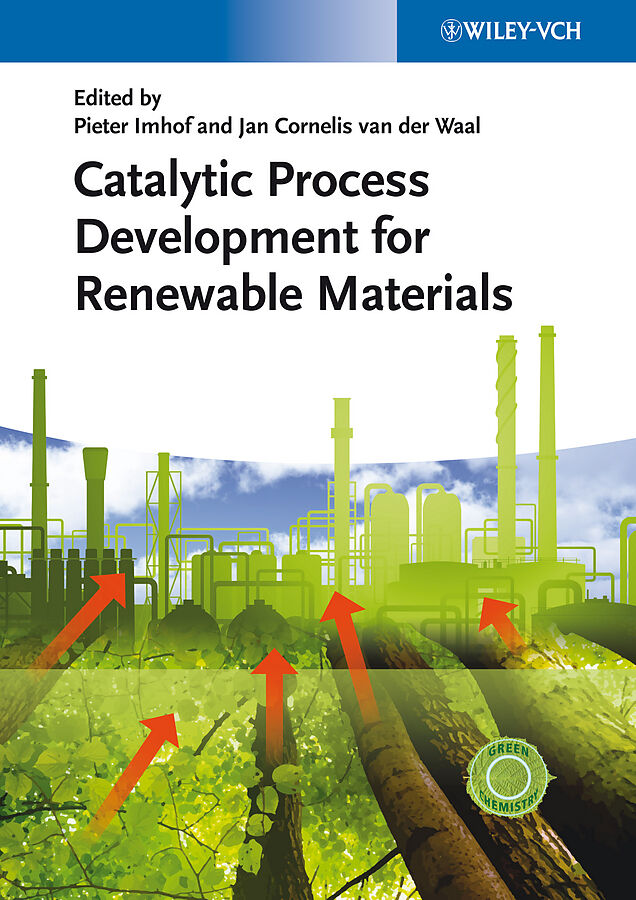Catalytic Process Development for Renewable Materials
Einband:
Fester Einband
EAN:
9783527331697
Untertitel:
Englisch
Genre:
Chemie
Herausgeber:
Wiley VCH Verlag GmbH
Auflage:
1. Auflage
Anzahl Seiten:
420
Erscheinungsdatum:
23.04.2013
ISBN:
978-3-527-33169-7
With contributions from authors at leading companies, providing first-hand knowledge that is hard to find elsewhere, this is the first volume to combine the fields of high throughput experimentation and catalytic process development for biobased materials in industry.
Green, clean and renewable are the hottest keywords for catalysis and industry. This handbook and ready reference is the first to combine the fields of advanced experimentation and catalytic process development for biobased materials in industry. It describes the entire workflow from idea, approach, research, and process development, right up to commercialization. A large part of the book is devoted to the use of advanced technologies and methodologies like high throughput experimentation, as well as reactor and process design models, with a wide selection of real-life examples included at each stage. The contributions are from authors at leading companies and institutes, providing firsthand information and knowledge that is hard to find elsewhere. This work is aimed at decision makers, engineers and chemists in industry, chemists and engineers working with/on renewables, chemists in the field of catalysis, and chemical engineers.
Autorentext
Dr. Pieter Imhof is currently VP Strategic Account Management at Avantium Chemicals B.V., after having held several positions in Research and Development, Technical Service, Marketing and Product Development both at Akzo Nobel Catalysts and Albemarle. Within Avantium, Pieter has been responsible for Global Business Development, Sales and Marketing for high throughput services and systems in both Chemical and Pharmaceutical Industry. Pieter obtained his M.Sc. and Ph.D degrees in Organometallic and Coordination Chemistry at the University of Amsterdam. He has published and contributed to over 100 scientific and conference papers and patents. Dr. Jan Cornelis van der Waal is Principal Scientist at Avantium Chemicals B.V. He studied Chemical Engineering at the Delft University of Technology (1987-1993) and received his Ph.D. at the same institute in 1998. After a postdoctoral assignment at the Royal Dutch Shell research and technology centre in Amsterdam for 2 years, he was involved in the foundation of Avantium Chemicals in 2000 and has since then worked for Avantium Technologies. Currently he is Principal Scientist Catalysts covering the area of biorenewable feedstocks conversion, in particular of oxygenates such as sugars, syn gas chemistries such as Fischer-Tropsch, Methanol and Ethanol synthesis, as well as selective oxidations and hydrogenations. He has published over 60 scientific and conference papers and patents.
Inhalt
THE NEXT FEEDSTOCK TRANSITION PREFACE THE INDUSTRIAL PLAYING FIELD FOR THE CONVERSION OF BIOMASS TO RENEWABLE FUELS AND CHEMICALS Introduction The Renewables Arena Renewable Fuels Renewable Chemicals Conclusions SELECTING TARGETS Introduction Target Selection Can Focus on Specific Structures or General Technologies Previous Selection Efforts Corroboration of the Value of Screening Studies The Importance of Outcomes and Comparisons of Outcomes Evaluation Processes Can be Comprised of a Variety of Criteria Catalysis Aspects Conclusions THE DEVELOPMENT OF CATALYTIC PROCESSES FROM TERPENES TO CHEMICALS Introduction Strain Engineering for the Production of Terpenes Terpene Building Blocks of Commercial Interest Sesquiterpenes as Chemical Building Blocks: ß-Farnesene Polymers Lubricants Conclusions FURAN-BASED BUILDING BLOCKS FROM CARBOHYDRATES Importance of Furans as Building Blocks Sources of Carbohydrates Carbohydrate Dehydration Conclusions and Further Perspectives A WORKFLOW FOR PROCESS DESIGN - USING PARALLEL REACTOR EQUIPMENT BEYOND SCREENING Introduction The Evolution of Parallel Reactor Equipment The Evolution of Research Methodology - Conceptual Process Design Essential Workflow Elements Other Examples of Parallel Reactor Equipment Applied Beyond Screening - Long-Term Catalyst Performance Concluding Remarks BRASKEM'S ETHANOL TO POLYETHYLENE PROCESS DEVELOPMENT Introduction Ethanol and Brazil Commercial Plants for Ethanol Dehydration Legislation and Certification Process Description Polymerization Conclusion FATS AND OILS AS RAW MATERIAL FOR THE CHEMICAL INDUSTRY Introduction - Setting the Scene, Definitions Why Fats and Oils Need Catalytic Transformation Catalytic Process Development - Conceptual Fatty Alcohols: Then and Now, a Case Study Conclusion and Outlook: Development Challenges for the Future PRODUCTION OF AROMATIC CHEMICALS FROM BIOBASED FEEDSTOCK Introduction Chemical Routes to Aromatic Chemicals from Biomass Biological Routes to Specific Aromatic Chemicals Lignin - The Last Frontier Considerations for Scale-Up and Commercialization Conclusion ORGANOSOLV BIOREFI NING: CREATING HIGHER VALUE FROM BIOMASS Introduction Concepts and Principles of Biorefinery Technologies Catalytic Processes Employed in Biorefining An Organosolv Biorefinery Process for High-Value Products Conclusions BIOMASS-TO-LIQUIDS BY THE FISCHER - TROPSCH PROCESS Basics of Fischer - Tropsch Chemistry and BTL Cobalt Fischer - Tropsch Catalysis Fischer - Tropsch Reactors Biomass Pretreatment and Gasification Biomass-to-Liquids Process Concepts BTL Pilot and Demonstration Plants XTL Energy and Carbon Efficiencies BTL Summary and Outlook CATALYTIC TRANSFORMATION OF EXTRACTIVES Introduction Fine and Special Chemicals from Crude Tall Oil Compounds Fine and Special Chemicals from Turpentine Compounds Conclusions Acknowledgment ENVIRONMENTAL ASSESSMENT OF NOVEL CATALYTIC PROCESSES BASED ON RENEWABLE RAW MATERIALS - CASE STUDY FOR FURANICS Introduction Energy Savings by Catalytic Processes LCA Methodology Case Study: Energy Analysis and GHG Balance of Polyethylene Furandicarboxylate (PEF) as a Potential Replacement for Polyethylene Terephthalate (PET) Discussion and Conclusions CARBON DIOXIDE: A VALUABLE SOURCE OF CARBON FOR CHEMICALS, FUELS AND MATERIALS Introduction The Conditions for Industrial Use of CO2 Carbon Dioxide Conversion Energy Products from CO2 Production of Inorganic Carbonates Enhanced Fixation of CO2 into Aquatic Biomass Conclusion and Future Outlook INDEX

Leider konnten wir für diesen Artikel keine Preise ermitteln ...
billigbuch.ch sucht jetzt für Sie die besten Angebote ...
Die aktuellen Verkaufspreise von 5 Onlineshops werden in Realtime abgefragt.
Sie können das gewünschte Produkt anschliessend direkt beim Anbieter Ihrer Wahl bestellen.
Loading...
Die aktuellen Verkaufspreise von 5 Onlineshops werden in Realtime abgefragt.
Sie können das gewünschte Produkt anschliessend direkt beim Anbieter Ihrer Wahl bestellen.
| # | Onlineshop | Preis CHF | Versand CHF | Total CHF | ||
|---|---|---|---|---|---|---|
| 1 | Seller | 0.00 | 0.00 | 0.00 |
